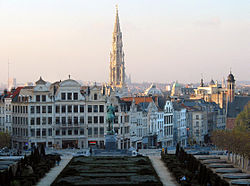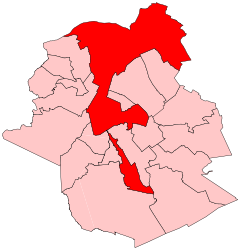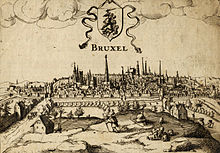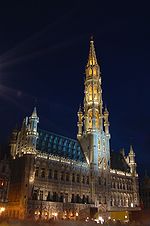- City of Brussels
-
This article explains the status of the municipality. For the city itself at the level of the Brussels-Capital Region, see Brussels.
City of Brussels Name transcription(s) - French Ville de Bruxelles - Dutch Stad Brussel 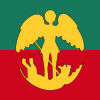
Flag
Coat of armsLocation in Belgium Coordinates: 50°51′N 04°21′E / 50.85°N 4.35°E Country Belgium Region Brussels Community Flemish Community
French CommunityArrondissement Brussels Government - Mayor (list) Freddy Thielemans (PS) Area - Total 32.61 km2 (12.6 sq mi) Population (1 January 2010)[1] - Total 157,673 - Density 4,835.1/km2 (12,522.9/sq mi) Postal codes 1000-1130 Area codes 02 Website www.brucity.be The City of Brussels (French: Bruxelles-Ville [bʀyˈsɛl ˈvil] or Ville de Bruxelles [ˈvil də bʀyˈsɛl], Dutch: Stad Brussel [ˈstɑt ˈbrʏ.səl], German: Stadt Brüssel [ˈʃtat ˈbrʏ.səl]) is the largest municipality of the Brussels-Capital Region, and the official capital of Belgium by law.[2]
Somewhat in the way that the City of London is different from London, the City of Brussels is different from Brussels. However, the expansion of the City was frozen at a later stage than the City of London, so that in addition to the old centre of Brussels, the towns of Haren, Laeken and Neder-Over-Heembeek to the north, and Avenue Louise and the Bois de la Cambre park to the south, are included.
On 1 January 2006, the City of Brussels had a total population of 144,784. The total area is 32.61 km² which gives a population density of 4,440 inhabitants per km². As of 2007, there were approximately 50,000 registered non-Belgians in the City of Brussels.[3]
Contents
Territorial history
At first, the City of Brussels was simply defined, being the area within the second walls of Brussels, the modern-day small ring. As the city grew, the surrounding villages grew as well, eventually growing into a contiguous city, though the local governments retained control of their area.
The construction of Avenue Louise was commissioned in 1847 as a monumental avenue bordered by chestnut trees that would allow easy access to the popular recreational area of the Bois de la Cambre. However, fierce resistance to the project was put up by the town of Ixelles (which was then still separate from Brussels) through whose land the avenue was supposed to run. After years of fruitless negotiations, Brussels finally annexed the narrow band of land needed for the avenue plus the Bois de la Cambre itself in 1864. That decision accounts for the unusual southeastern protrusion of the City of Brussels and for Ixelles being split in two separate parts. The Université Libre de Bruxelles' Solbosch campus is also part of the City of Brussels, partially accounting for the bulge in the southeast end.
Unlike most of the municipalities in Belgium, the ones located in the Brussels-Capital Region were not merged with others during mergers occurring in 1964, 1970, and 1975.[4] However, several municipalities been merged with the City of Brussels throughout its history including Laeken, Haren, and Neder-Over-Heembeek, which were merged into the City of Brussels in 1921.[5]
Mayors
As in every other Belgian municipality, the City of Brussels is headed by a mayor, which should be confused with neither the Minister-President of the Brussels-Capital Region nor the Governor of Brussels-Capital.
Capital of Belgium
According to the Belgian Constitution (Art. 194) the capital of Belgium is the City of Brussels municipality. Arguments that the use of lower case in "ville" and "stad" in Article 194 for "ville de Bruxelles" (French), "stad Brussel" (Dutch) makes a subtle difference and means that Brussels at large is the capital cannot be defended on a legal basis. However, although the City of Brussels is the official capital, the funds delegated by the federation and region for the representative role of the capital are divided among the 19 municipalities and, in practice, national Belgian institutions are indeed located not only in the City of Brussels, although many are, but also in most of the other 18 municipalities of the Brussels-Capital region. The implication is that de facto the entire Region serves as capital, but de jure only the City of Brussels is entitled to the title of capital of Belgium.
See also
- Brussels
- List of mayors of the City of Brussels
- Transport in Brussels
References
- ^ Population per municipality on 1 January 2010 (XLS; 221 KB)
- ^ Article 194 of Belgium's constitution
- ^ Statistics foreign population in Belgium by municipality (in French and Dutch only)
- ^ Picavet, Georges (29 April 2003). "Municipalities (1795-now)". Georges Picavet. http://belgium.rootsweb.ancestry.com/bel/_places/bel_places.html. Retrieved 2009-04-05.
- ^ "Brussels Capital-Region". Georges Picavet. 4 June 2005. http://belgium.rootsweb.ancestry.com/bel/2bru/index.html. Retrieved 2009-04-05.
External links
- Official web site of The City of Brussels
- Page related to The City of Brussels in the Brussels-Capital Region official web site
- Webcam Grand-Place Brussels
- Interactive map of Brussels historical city centre
 Brussels topicsHistoryFortifications · 1695 bombardment · 1746 siege · Duchess of Richmond's ball · Covering of the Senne · Frenchification · Expo 1897 · Liège International (1905) – Expo 1910 · Expo 1958 · L'Innovation Department Store fire · Heysel Stadium disaster
Brussels topicsHistoryFortifications · 1695 bombardment · 1746 siege · Duchess of Richmond's ball · Covering of the Senne · Frenchification · Expo 1897 · Liège International (1905) – Expo 1910 · Expo 1958 · L'Innovation Department Store fire · Heysel Stadium disaster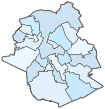 AdministrationTransportMetro · Brussels Airport · Charleroi Airport · North-South connection · Trams · Brussels Ring · Small RingOther topicsLists
AdministrationTransportMetro · Brussels Airport · Charleroi Airport · North-South connection · Trams · Brussels Ring · Small RingOther topicsListsPortal Categories:- Municipalities of the Brussels-Capital Region
- Government of Brussels
Wikimedia Foundation. 2010.

